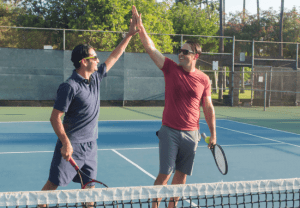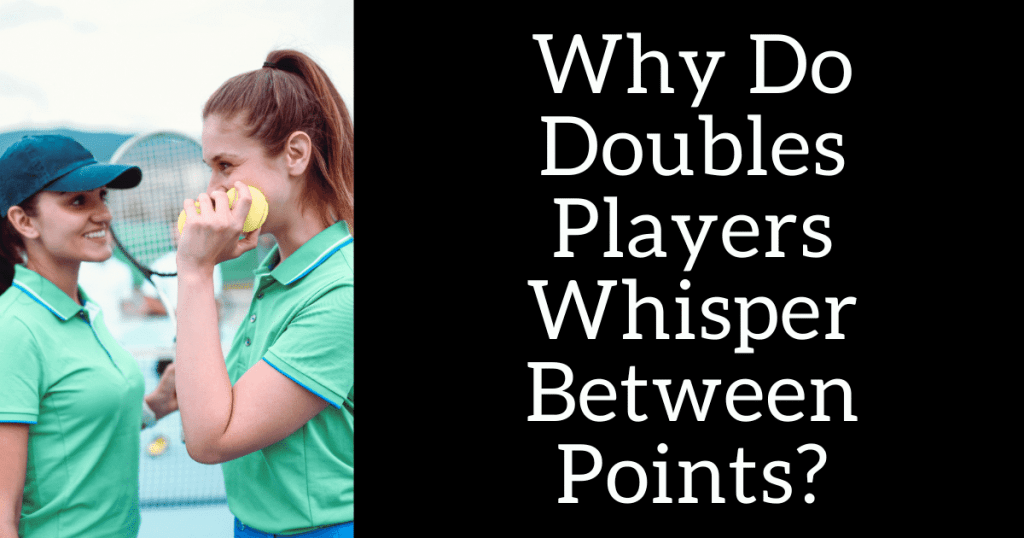Doubles tennis is not just tennis with two people on both sides of the net. Doubles tennis is a completely different animal than singles tennis.
There is a team sport dynamic in doubles that involves strategy, synergy and team spirit.
Doubles is extremely mental and in doubles match play you rely on your partner to do their part to secure the win for your team.
Doubles tennis can be very physical so there is not a lot of time to talk to your partner while you are running all over the court.
Because these matches are fast paced, talking is a way to keep things light.
While it may seem odd, doubles players whisper between points. We’ll cover a number of the reasons why here.
Contents
Communicating with your Tennis Doubles Partner

Doubles can be a terrible experience or the most fun you have ever had playing tennis.
When it comes to doubles, your partner is a huge factor on whether or not it’s terrible or fun. You’re half the team so it’s on you as well, but there’s a chemistry in playing doubles.
Communication is important for developing and nurturing chemistry. Finding the right partner that matches your skill level and personality type can make or break the experience.
A poor partner choice may result in losing game after game, while the right partner can make winning much more likely.
Ideally, you want your partner to be just a little better than you are so you can learn from them.
Is Whispering Necessary when Playing Doubles?
There’s a lot of communicating that happens on a tennis court.
Since doubles means you have a partner, you often have to speak to communicate your intentions. Hand signals are used (covered below), but speaking is what most of us are used to.
However, if you speak in a normal volume, your opponent knows what your plan is and can prepare. By whispering on the tennis court, you and your partner can be on the same page without tipping off your opponents.
Heck some players take things so far that they cover up their mouths while speaking in case there’s a lip-reading expert across the net!
What are those Hand Signals Doubles Players Use?
Whether serving or returning often you’ll see doubles players giving each other signals. Mostly it’s the person at the net signaling to their partner.
What are those signals? What do they mean?
Tennis doubles teams can make up their own signals, but there are a few that are relatively well-known and used in the world of doubles.
Whether returning serve or serving, the net person drives the hand signals as they’re up at net.
They’re a little more vulnerable being so close to the net and could get nailed by a groundstroke from their opponent.
For the team that’s serving, the net person chooses whether or not they want to poach – move from their current net position after their partner has served.
They can choose to stay put or move to try to cut off the return of serve with a quick volley and (hopefully) quick point! A typical signal from the net person when staying put is a CLOSED FIST.

If your doubles partner plans to poach – move from the serving position – often an OPEN PALM is used.

Whispering on Court: Doubles Strategy
Because of all the possible outcomes of each serve there are a lot of things happening during a doubles match.
There are as many strategies in doubles as there are players.
Unless you have played with your partner tons of times and know exactly what their next move will be, there are going to be times you need to communicate.
Doubles Return Game – 1st Serve vs 2nd Serve
One of the things that doubles players whisper about on court is receiving the first serve.
In recreational tennis many players have a decent first serve and do some praying that their second serve will go in.
Knowing this there’s often more pressure when receiving a first serve than a second serve.
Having discussed your plan of attack for how to return the first serve will help your partner.
For instance, you discuss that if the first serve comes to your forehand on the deuce side, you plan on hitting cross court. That’s a generally typical return in doubles – go for the open court.
However, if you’re the returning on the ad side (left) and a serve comes out wide to your backhand (as a right-handed player), you may tell your partner that you’re going to try to hit it into the alley – very close to the opposing net person.
- You may surprise the net person because they’re assuming you’ll go for the more open court by hitting cross court.
- You may hit a screaming shot and it blazes by the net person and the point is yours.
- You may not hit it as cleanly as you’d hoped and the net person hits a volley and aims for your partner.
In this instance, giving your partner a heads up of your plan helps them to prepare for what might come next. Communication – it works!
Highlight the Opposing Team’s Weaknesses
When playing doubles, it is important to play to your strengths especially if they align with your opponents’ weaknesses.
Often doubles players whisper between points about observations they see in the other team, especially strengths and weaknesses that are standing out.
“His timing is off on his forehand – hit there for a while” or “Her backhand return is on fire – let’s try not to serve her out wide” are typical things that may be whispered about.
Exposing weaknesses to help your team win may seem harsh, but doubles is competitive and everyone on court wants to win.
Even if all four players are acting polite, everyone wants the W!
Doubles Partnership Morale Boosting

Tennis is a mental game. Even though playing doubles may seem more social, it’s still competitive.
Because of the mental and emotional aspects of tennis, your mood and attitude can make a big impact on your performance.
Doubles partners will often speak to each other when one of them needs a boost.
Things like “It’s OK that was a tough serve” or “Nice shot!” or “Keep it up!’ will can keep everyone’s mood up.
If you notice your doubles partner scowling or starting to look upset, it is time for a mini pow wow.
This morale boosting is quite common in doubles and happens all the time. Because of hushed voices you just may not always hear it.
Does Your Doubles Partner Complain a Lot?
We are all human and tennis players are notoriously emotional creatures! Remember John McEnroe’s famous temper tantrums
Although whining or venting to your partner is not particularly helpful, it is a human stress response and happens all the time.
PRO TIP: Don’t reprimand your doubles partner during a match. It’s tennis and it’s supposed to be fun. Nobody purposely goes out on a tennis court to play poorly. People have bad days and being told that you’re a disappointment or should have made that shot will not improve your partner’s playing. If your partner is whining, just be encouraging. Don’t tell them to “suck it up.”
Complaining about the other team is probably one of the most common whispering that happens on a doubles court. “She keeps lobbing me” or “his grunting is making me nuts” are common types of conversations you may hear out there. Or maybe not because they’re whispering!
Doubles Tennis Talking Etiquette
There is no hard and fast rule about talking or whispering to your tennis doubles partner during a match.
Even though there isn’t a specific rule I think there is a right and wrong way to do it.
The right way to do it is between points. All players players are toweling off, collecting any tennis balls, and getting into position for the next point.
You’re given 25 seconds to finish and be ready for the next point. During this time, you are not holding anyone up by having a short conversation about whatever you want to talk about.
The wrong way to do it is when you are having a conversation and holding up play. The serving team is responsible for dictating the pace of the match. They may take all the allotted time or they may be on a roll and want to get things moving.
If you and your partner hold up play, that’s very rude. If you do this a couple times during a game, I can guarantee you will be the topic of conversation between points, and you will not want to hear what they are saying about you… trust me!
Ready for Your Next Doubles Match?
Whether you’re a regular on the doubles circuit or you play once in a blue moon, be mindful of your level of communication with your partner.
Try out some hand signals and have fun with it! While you may not be perfect the right out of the gate, you’ll definitely learn something.

